Fleurs du Mal Magazine


Or see the index

Plainte sur la mort de Sylvie
Ruisseau qui cours après toi-même
Et qui te fuis toi-même aussi,
Arrête un peu ton onde ici
Pour écouter mon deuil extrême.
Puis, quand tu l’auras su, va-t’en dire à la mer
Qu’elle n’a rien de plus amer.
Raconte-lui comme Sylvie,
Qui seule gouverne mon sort,
A reçu le coup de la mort
Au plus bel âge de la vie,
Et que cet accident triomphe en même jour
De toutes les forces d’Amour.
Las ! je n’en puis dire autre chose,
Mes soupirs tranchent mon discours.
Adieu, ruisseau, reprends ton cours
Qui, non plus que moi, se repose ;
Que si, par mes regrets, j’ai bien pu t’arrêter,
Voici des pleurs pour te hâter.
Marc-Antoine Girard de Saint-Amant
(1594 – 1661)
Plainte sur la mort de Sylvie
• fleursdumal.nl magazine
More in: # Classic Poetry Archive, Archive G-H, Archive S-T, Archive S-T
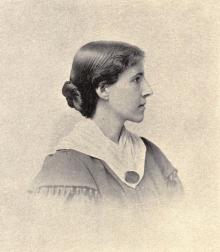
Boys will be boys
“Boys will be boys,” and boys have had their day;
Boy-mischief and boy-carelessness and noise
Extenuated all, allowed, excused and smoothed away,
Each duty missed, each damaging wild act,
By this meek statement of unquestioned fact–
Boys will be boys!
Now, “women will be women.” Mark the change;
Calm motherhood in place of boisterous youth;
No warfare now; to manage and arrange,
To nurture with wise care, is woman’s way,
In peace and fruitful industry her sway,
In love and truth.
Charlotte Perkins Gilman
(1860-1935)
Boys will be boys
Suffrage Songs and Verses
• fleursdumal.nl magazine
More in: # Classic Poetry Archive, Archive G-H, Archive G-H, Feminism
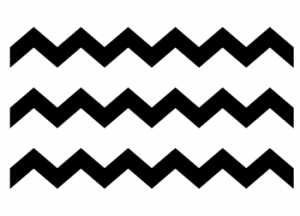
Die Tänzerin
Denn tanzen muss sie.
Dem tollen Rad verflochten
Gliedert sie Chaos,
Schwendet Quellen,
Stampft zuckende Krater.
Im Drang
Des großen Taktes
Tanzt sie Gestirne.
Bess Brenck-Kalischer
(Betty Levy, 1878-1933)
Die Tänzerin
• fleursdumal.nl magazine
More in: #Editors Choice Archiv, Archive A-B, Archive A-B
A revelatory new portrait of the courageous woman who saved Dostoyevsky’s life—and became a pioneer in Russian literary history
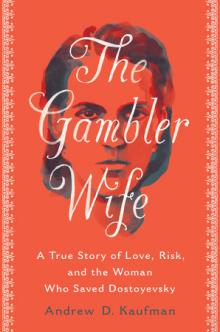 In the fall of 1866, a twenty-year-old stenographer named Anna Snitkina applied for a position with a writer she idolized: Fyodor Dostoyevsky. A self-described “emancipated girl of the sixties,” Snitkina had come of age during Russia’s first feminist movement, and Dostoyevsky—a notorious radical turned acclaimed novelist—had impressed the young woman with his enlightened and visionary fiction.
In the fall of 1866, a twenty-year-old stenographer named Anna Snitkina applied for a position with a writer she idolized: Fyodor Dostoyevsky. A self-described “emancipated girl of the sixties,” Snitkina had come of age during Russia’s first feminist movement, and Dostoyevsky—a notorious radical turned acclaimed novelist—had impressed the young woman with his enlightened and visionary fiction.
Yet in person she found the writer “terribly unhappy, broken, tormented,” weakened by epilepsy, and yoked to a ruinous gambling addiction. Alarmed by his condition, Anna became his trusted first reader and confidante, then his wife, and finally his business manager—launching one of literature’s most turbulent and fascinating marriages.
The Gambler Wife offers a fresh and captivating portrait of Anna Dostoyevskaya, who reversed the novelist’s freefall and cleared the way for two of the most notable careers in Russian letters—her husband’s and her own. Drawing on diaries, letters, and other little-known archival sources, Andrew Kaufman reveals how Anna warded off creditors, family members, and her greatest romantic rival, keeping the young family afloat through years of penury and exile.
In a series of dramatic set pieces, we watch as she navigates the writer’s self-destructive binges in the casinos of Europe—even hazarding an audacious turn at roulette herself—until his addiction is conquered. And, finally, we watch as Anna frees her husband from predatory contracts by founding her own publishing house, making Anna the first solo female publisher in Russian history.
The result is a story that challenges ideas of empowerment, sacrifice, and female agency in nineteenth-century Russia—and a welcome new appraisal of an indomitable woman whose legacy has been nearly lost to literary history.
Andrew D. Kaufman is an associate professor, General Faculty, lecturer in Slavic Languages and Literatures, and assistant director of the Center for Teaching Excellence at the University of Virginia. A PhD in Slavic languages and literatures from Stanford University, Kaufman is the author of Give War and Peace a Chance: Tolstoyan Wisdom for Troubled Times and Understanding Tolstoy, and a coauthor of Russian for Dummies. His work has been featured on Today, NPR, and PBS, and in The Washington Post, and he has served as a Russian literature expert for Oprah’s Book Club. Kaufman is the creator of Books Behind Bars, introducing incarcerated youth to the writings of Dostoyevsky and other authors.
The Gambler Wife:
A True Story of Love, Risk,
and the Woman Who Saved Dostoyevsky
by Andrew D. Kaufman
Publisher: Penguin Publishing Group
Publication date: 08/31/2021
Hardcover
Pages: 400
ISBN-13: 9780525537144
$30.00
• fleursdumal.nl magazine
More in: #Biography Archives, - Book News, - Book Stories, Archive K-L, Art & Literature News, The Ideal Woman

KINDERBOEKENWEEK 2021
worden wat je wil
6 t/m 17 oktober 2021
Meer informatie: https://kinderboekenweek.nl/
• fleursdumal.nl magazine
More in: - Book News, - Bookstores, AUDIO, CINEMA, RADIO & TV, Kinderboekenweek

Achter de dijk
Achter de dijk ligt
water. Ik weet het.
Er gaan boten doorheen
en de meeuwen kennen
het getij.
Zo af en toe duikt
er wel eens een
zekerheid op.
Bert Bevers
Achter de dijk
Gedicht
Uit: Het verlangen naar heimwee, Dijkpers, Bath, 1982
• fleursdumal.nl magazine
More in: Archive A-B, Archive A-B, Bevers, Bert
Master Suffering pendulates between yield and command; the bodies of this book are supplicant yet seething—they want nothing more than to survive.
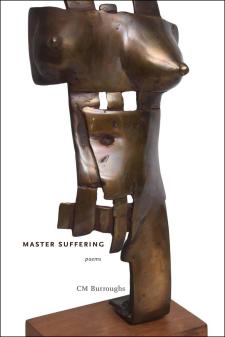
But how does a woman survive?
One’s own healthy body helps, but illness is one of the masters of this book.
Faith can be a salve for the inscrutable ailments of the body, but God is unreliable in these poems.
The female bodies of Master Suffering want power; they want to control and to correct the suffering they witness and withstand.
CM Burroughs is Associate Professor of Poetry at Columbia College Chicago. She is the author of two collections: The Vital System (Tupelo Press, 2012) and Master Suffering (Tupelo Press, 2020.) Burroughs has been awarded fellowships and grants from Yaddo, the MacDowell Colony, Djerassi Foundation, Virginia Center for the Creative Arts, and Cave Canem Foundation. She has received commissions from the Studio Museum of Harlem and the Warhol Museum to create poetry in response to art installations. Burroughs’ poetry has appeared in many journals and anthologies.
Master Suffering
Poems
by CM Burroughs
Format: Paperback
Published: Jan. 2021
Tupelo Press, Inc.
ISBN: 978-1-946482-38-9
$18.95
• fleursdumal.nl magazine
More in: #Editors Choice Archiv, - Book Lovers, - Book News, Archive A-B, Archive A-B, Art & Literature News

Grey Eyes
She glanced across the path to me,
Grey eyes!
Her looks were kisses plain to see.
I gave her glances back to her —
Glad eyes!
She saw the lifting of despair.
From memory a face looked out,
Dim eyes!
No years could sour that love to doubt.
My soul would nevermore be lone —
Bride’s eyes!
Hearts still were waiting for my own.
Our souls uncurtained then, perchance —
Deep eyes!
Each built an epoch in a glance.
Out of her fellowship so free
Light eyes!
She gave some gladness unto me.
And I gave? As we turned apart —
Dead eyes!
I saw the shudder in her heart.
Arthur Adams
(1872-1936)
Grey Eyes
• fleursdumal.nl magazine
More in: Adams, Arthur, Archive A-B, Archive A-B
« Ce livre n’est pas un livre de deuil. Le deuil, c’est après. […] La vivacité du présent. Celle du sentiment. La trace que nous laissons aux autres. Ces particules de temps et d’affection mêlés demeurent en suspens. Ici, ce sont elles qui commandent, et avec elles, le souffle que sa mort m’a laissé au cœur. »
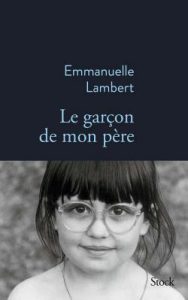
Le récit s’ouvre un dimanche de septembre 2019, un dimanche où le père « concret et nébuleux à la fois » d’Emmanuelle Lambert, se prépare à mourir d’un cancer de l’ampoule, un organe situé à la tête du pancréas.
Et pourtant, ce livre est un livre de vie. C’est que, par une douce ironie des mots, il est à l’image de ce personnage de père à la «chaleur explosive» : «rétif à toute forme de rêverie fatiguée, car dans la fatigue se glisse un effritement possible, une voie pour la douleur et le doute».
Le duo du livre-tombeau et du père illumine tout sur son passage. Il n’y a pas de gris ici, mais les couleurs éclatantes du souvenir, du mange-disques seventies aux yeux de Dalida.
Poignant et solaire, émouvant et lumineux, mélancolique sans le poids du pathos, familial et universel, le récit d’une fille raconte le père : mais le père aurait peut-être voulu un garçon.
À l’hyperactif soixante-huitard, au Dieu imprévisible de l’enfance, à l’ex-enfant triste qui joue jusqu’au bout de sa vie y compris en abordant aux rivages de la fin, répond une fille, qui se construit comme une femme. Avec une subtilité infinie, Emmanuelle Lambert traite dans ce livre de bien des thèmes, de l’intime au collectif, du masculin au féminin, et celle que son père, « le grand tonique » surnommait « Dudule », confirme l’écrivain de premier plan qu’elle est devenue.
Emmanuelle Lambert est l’auteure, entre autres, d’un roman, La Désertion (Stock, 2018), et d’un essai littéraire, Giono, furioso (Stock, 2019), couronné par le prix Femina de l’essai en 2019. Elle a été la commissaire de l’exposition Giono au Mucem, et vient d’éditer les romans et poèmes de Jean Genet dans la Pléiade.
Le garçon de mon père
Emmanuelle Lambert
Parution: 25/08/2021
Collection: Stock – La Bleue
180 pages
Format: 135 x 215 mm
EAN: 9782234090019
Prix: € 18.50
• fleursdumal.nl magazine
More in: - Book News, - Bookstores, Archive K-L, Archive K-L
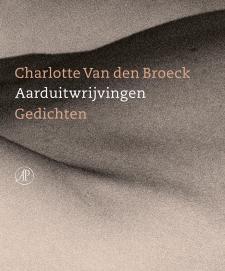 Deze bundel, vrucht van een verblijf in Death Valley, is een verzameling van veranderlijke landschappen en de wisselende lichamen die zich erin voortbewegen.
Deze bundel, vrucht van een verblijf in Death Valley, is een verzameling van veranderlijke landschappen en de wisselende lichamen die zich erin voortbewegen.
De gedichten zelf zijn evenzovele oefeningen in waarneming.
In de ruimten tussen aanblik en uiterlijke verschijning ontstaan beelden, onderhevig aan kleuren, texturen en zintuigen.
En deze beelden rijgen zich aaneen tot wat misschien wel feministische natuurgedichten kunnen worden genoemd over zaken als erotiek, bloei, geweld en kwetsuur:
‘de woestijn woelt en sleept haar laken mee
er ontwaakt
een vrouw zonder beschadigingen, ze kleedt zich
voor een dagtocht, ze zeult geen geesten’.
Charlotte Van den Broeck (1991) maakte op overdonderende wijze haar entree in de Nederlandse literatuur. Haar eerste twee dichtbundels werden overladen met lof en bekroond met de Herman de Coninck Debuutprijs en de Paul Snoeckprijs. Haar prozadebuut Waagstukken, een bestseller met 15.000 verkochte exemplaren, viel eveneens in de prijzen.
Aarduitwrijvingen
Gedichten
Auteur: Charlotte Van den Broeck
Uitgeverij: De Arbeiderspers
Publicatiedatum: 14-09-2021
Paperback
NUR: 306
ISBN: 9789029539722
Prijs: € 19,99
• fleursdumal.nl magazine
More in: - Book News, - Bookstores, Archive A-B, Archive A-B
Our Bodies, Their Battlefield: What War Does to Women by Christina Lamb
From Christina Lamb, the coauthor of the bestselling I Am Malala and an award-winning journalist—an essential, groundbreaking examination of how women experience war.
In Our Bodies, Their Battlefields, longtime intrepid war correspondent Christina Lamb makes us witness to the lives of women in wartime. An award-winning war correspondent for twenty-five years (she’s never had a female editor) Lamb reports two wars—the “bang-bang” war and the story of how the people behind the lines live and survive. At the same time, since men usually act as the fighters, women are rarely interviewed about their experience of wartime, other than as grieving widows and mothers, though their experience is markedly different from that of the men involved in battle.
 Lamb chronicles extraordinary tragedy and challenges in the lives of women in wartime. And none is more devastating than the increase of the use of rape as a weapon of war. Visiting warzones including the Congo, Rwanda, Nigeria, Bosnia, and Iraq, and spending time with the Rohingya fleeing Myanmar, she records the harrowing stories of survivors, from Yazidi girls kept as sex slaves by ISIS fighters and the beekeeper risking his life to rescue them; to the thousands of schoolgirls abducted across northern Nigeria by Boko Haram, to the Congolese gynecologist who stitches up more rape victims than anyone on earth. Told as a journey, and structured by country, Our Bodies, Their Battlefields gives these women voice.
Lamb chronicles extraordinary tragedy and challenges in the lives of women in wartime. And none is more devastating than the increase of the use of rape as a weapon of war. Visiting warzones including the Congo, Rwanda, Nigeria, Bosnia, and Iraq, and spending time with the Rohingya fleeing Myanmar, she records the harrowing stories of survivors, from Yazidi girls kept as sex slaves by ISIS fighters and the beekeeper risking his life to rescue them; to the thousands of schoolgirls abducted across northern Nigeria by Boko Haram, to the Congolese gynecologist who stitches up more rape victims than anyone on earth. Told as a journey, and structured by country, Our Bodies, Their Battlefields gives these women voice.
We have made significant progress in international women’s rights, but across the world women are victimized by wartime atrocities that are rarely recorded, much less punished. The first ever prosecution for war rape was in 1997 and there have been remarkably few convictions since, as if rape doesn’t matter in the reckoning of war, only killing. Some courageous women in countries around the world are taking things in their own hands, hunting down the war criminals themselves, trying to trap them through Facebook.
In this profoundly important book, Christina Lamb shines a light on some of the darkest parts of the human experience—so that we might find a new way forward. Our Bodies, Their Battlefields is as inspiring and empowering is as it is urgent, a clarion call for necessary change.
Christina Lamb is one of Britain’s leading foreign correspondents and a bestselling author. She has reported from most of the world’s hotspots starting with Afghanistan after an unexpected wedding invitation led her to Karachi in 1987 when she was just 22. She moved to Peshawar to cover the mujaheddin fighting the Soviet Union and within two years she had been named Young Journalist of the Year. Since then she has won 15 major awards including five times being named Foreign Correspondent of the Year and Europe’s top war reporting prize, the Prix Bayeux. She was made an OBE by the Queen in 2013 and is an honorary fellow of University College, Oxford.
Our Bodies, Their Battlefield:
What War Does to Women
by Christina Lamb
Publisher: William Collins
5 Mar. 2020
Language: English
Hardcover: 432 pages
ISBN-10: 0008300003
ISBN-13: 978-0008300005
£14.99
• fleursdumal.nl magazine
More in: - Book Stories, - Bookstores, Archive K-L, Feminism, MONTAIGNE, WAR & PEACE

Covid poem
Working in ITU Dept at a time of Covid 19
You cried for those eyes that felt no warmth,
for the afterthoughts of conversations yet to be finished.
The utter confinement gave little comfort in the dying cold
of pipes and masks, the smacking of latex gloves
trapping hands in sweaty health, the fear of a closing down.
The complete violation of sleep’s healing process,
static and dispassionate, mechanical air forced through.
The healthy milling around big bodies on small beds,
in plastic bubbles, lying on their bellies with loved ones far away.
Vincent Berquez
Vincent Berquez is a London–based artist and poet. He has published in Britain, Europe, America and New Zealand. His work is in many anthologies, collections and magazines worldwide (f.i. fleursdumal.nl).
• fleursdumal.nl magazine
More in: Archive A-B, Archive A-B, Berquez, Vincent, Vincent Berquez
Thank you for reading Fleurs du Mal - magazine for art & literature